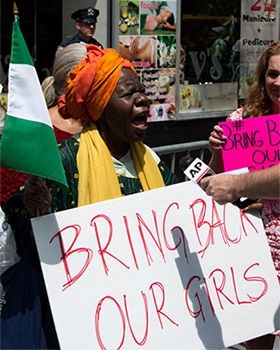Bottom Line Up Front
- Amid surging outrage in Nigeria and abroad—and the acute focus generated by the #BringBackOurGirls social media campaign—over Boko Haram’s kidnapping of 276 schoolgirls, President Obama has promised that the US will do “everything it can” to help rescue them
- US support efforts are challenged in a number of ways to include current US legislation that restricts direct military assistance to a foreign country where credible information indicates civil rights abuses by its military, and Washington remains concerned about past heavy-handed tactics by the Nigerian army
- In a video released May 12, Boko Haram’s leader demanded the release of all Boko Haram prisoners in exchange for the girls; the Nigerian government said it is considering all options for the girls’ release, including, for the first time, negotiations.
Time and Distance
On May 9, the first members of the US team of military and law enforcement personnel skilled in intelligence gathering, hostage negotiation, and victim assistance arrived in Nigeria’s capital Abuja. They joined a US team already in the country to assist the government with counterterrorism issues. US intelligence, surveillance and reconnaissance support already in place is reported to include manned aerial reconnaissance missions covering northeast Nigeria, and analysis of satellite photos and Boko Haram’s latest video release. Britain has sent personnel, and China and Spain have also pledged help in the search. In addition to agreeing to send personnel, France’s President Hollande called for a West African nations security summit to address terrorism and, specifically, the Boko Haram crisis. Nigeria’s President Goodluck Jonathan accepted Israeli’s offer to send a counterterrorism team. While the US is reportedly weighing Nigeria’s request to provide additional surveillance platforms to include drones, officials have emphasized that US troops will not be directly involved in any rescue attempt.
The on-ground American team deployed to help search for Nigeria’s kidnapped girls will offer valuable expertise to the Nigerian government, but is faced with significant challenges. Abuja is 350 miles from the border of Borno State, where the kidnappings took place, and 500 miles from Maiduguri, the Borno state capital and epicenter of the Boko Haram crisis.
Legal limits to assistance
The Obama administration will no doubt be criticized for failing to do more, but its hands are tied. A law called the Leahy Amendment strictly prohibits direct military assistance to any foreign military unit where credible information indicates it has violated human rights—until it can pass a vetting process or restrictions are waived due to extraordinary circumstances. Before the American “coordination cell” can provide more than limited support, it somehow will have to certify that the Nigerian troops it is assisting are not guilty of perpetrating human rights abuses.
That is likely to be exceptionally difficult. Since 2009, the Nigerian military has been widely accused by local witnesses and human rights groups of killing thousands of people—many of them innocent civilians—in its efforts to destroy Boko Haram. The military is accused of burning an entire village to the ground in April 2013, and of summarily executing scores of suspects. Almost one year ago, those abuses by Nigerian troops forced US Secretary of State John Kerry to declare, “we are…deeply concerned by credible allegations that Nigerian security forces are committing gross human rights violations, which, in turn, only escalate the violence and fuel extremism.” Because the murder of civilians is believed to be so extensive and systemic, finding a Nigerian military unit that does not have blood on its hands will be tricky—and it may require shipping an entirely new crop of Nigerian soldiers to the north. Large numbers of Nigerian soldiers already have rotated in and out of the counterinsurgency campaign.
Limited Interests
For years, Washington has invested resources in strengthening the Nigerian military. However, the national security interests involved in that decision had arguably less to do with the threat of violent extremism from Boko Haram or other terrorist groups than it did in assuring the stability of Africa’s largest oil producer. During 2008 to 2013, the US imported an average of 726,000 barrels of oil daily from Nigeria—just over six percent of its total imports. The Boko Haram insurgency, though damaging to the integrity of the Nigerian state, does not directly threaten the oil industry centered in the south-central Niger delta region. This may help explain the Nigerian government’s failure to invest fully in defeating the group, as it preys on an economically marginalized and poorly integrated region of the country with limited economic value to the ruling elite.
There will surely be more victims in the future (Boko Haram attacks on the villages of Gamboru Ngala and Warabe have been reported in the past two days), and if the US can help the Nigerian government reign in the excesses of its soldiers, local citizens might be more willing to share vital information with investigators and troops. But that is an effort that will take months or years, not days, to bear fruit.
FORECAST
- While Boko Haram is an appropriate target for US counterterror efforts, Washington will be wary of putting an American face on the brutal tactics of the Nigerian military, and will consequently limit its involvement
- With only about 100 of the kidnapped girls appearing in Boko Haram’s latest video, it suggests they may have been divided into smaller groups, or bears out the fear the US State Department expressed several days ago that some may have already been sold into slavery in the neighboring countries of Cameroon and Chad
- However, based on Boko Haram leader Abubakar Shekau’s recent communiqué and the trend of West Africa and Sahel belt terrorist groups’ involvement in hostage taking, it’s likely the group will use most of the girls for ransom and exchange for its jailed members. The US may still find additional avenues for assistance
